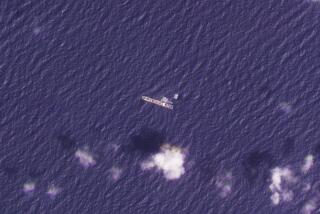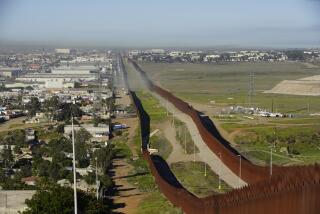Morocco Pins Its Hope for Future on Span to Spain
- Share via
RABAT, Morocco — Muslim Morocco and Roman Catholic Spain are to build a bridge to link Europe and Africa across the Strait of Gibraltar, the Atlantic gateway to the Mediterranean.
“I hope it will be built before 2000,” Morocco’s King Hassan II said in a recent interview with the Spanish newspaper ABC.
He gave no estimate of the cost of the project or when work was expected to start on the link across the busy waterway, about 10 miles wide at its narrowest point and 250 to 900 yards deep.
In Morocco the project is considered as significant as the building of the Suez Canal more than 100 years ago to connect the Mediterranean to the Red Sea.
“It will be a bridge . . . which has been agreed by all,” said Hassan, who has previously described Morocco as Europe’s “back yard’.
Experts three years ago estimated that the bridging of the strait, first approved by Spain’s King Juan Carlos I and King Hassan in 1979, would cost at least $2 billion, but costs have risen sharply since.
Spain and Morocco are being driven by political and economic forces to forge closer links.
“We should seriously consider the benefits of joining the continents of Europe and Africa,” Hassan said.
The bridge would strengthen Morocco’s economic bonds with Spain and the other 11 members of the European Community. Rabat is keen to join the EC, but last year its application was rejected.
It would also make Morocco an important axis of an overland transport system for trade and tourism between European, Arab and African countries, Moroccan officials say.
The bridge is expected to cross the strait from Capa Malabata, east of Tangier, in Morocco, to Punta Paloma, about 6 miles west of the Spanish town of Tarifa.
Europe imports many raw materials from Africa and in return exports capital and consumer goods to the continent.
Half of Morocco’s imports come from the EC and 40% of its exports are sold to the community.
A joint Moroccan-Spanish committee agreed at a meeting in Rabat last October to convene a conference of European and African business and transport leaders in Morocco in 1990 to promote the scheme and win financial backing.
“The project has assumed a serious image for the international scientific community, which we hope would be reinforced by the conference,” the leader of the Spanish delegation, Manuel Pandadaro, told the meeting.
More to Read
Sign up for Essential California
The most important California stories and recommendations in your inbox every morning.
You may occasionally receive promotional content from the Los Angeles Times.












